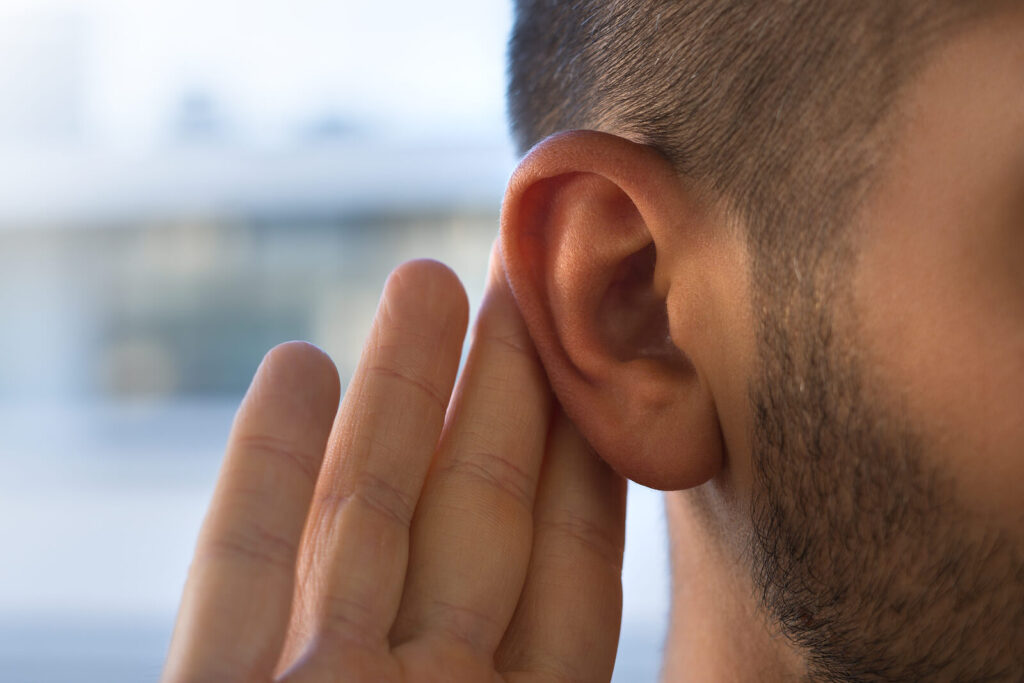Vascular dementia and hearing loss are two health issues that often affect older adults. While these conditions may seem unrelated at first glance, recent research has revealed intriguing connections between them.
In this article, we’ll explore what vascular dementia and hearing loss are, how they might be linked and what this means for individuals and their families.
What is Vascular Dementia?
Definition and Causes
Vascular dementia is a type of dementia caused by reduced blood flow to the brain. This can be a result from a series of small strokes or other conditions that damage blood vessels and reduce circulation. When brain cells are deprived of oxygen and nutrients, they die, leading to cognitive impairments.
Symptoms of Vascular Dementia
The symptoms of vascular dementia can vary depending on the part of the brain affected. Common symptoms include:
- Memory loss
- Difficulty concentrating and organising thoughts
- Confusion
- Mood changes, such as depression or apathy
- Difficulty walking or balancing
- Trouble speaking or understanding speech
Diagnosis and Treatment
Diagnosing vascular dementia involves a thorough medical examination, including a review of the patient’s medical history, neurological exams and brain imaging studies.
Treatment focuses on managing underlying conditions such as high blood pressure, diabetes and high cholesterol, to prevent further brain damage. There are also medications available that can help manage symptoms.
There is currently no cure for vascular dementia.
Understanding Hearing Loss
Types of Hearing Loss
Hearing loss can occur in various forms, and understanding these is crucial for proper diagnosis and treatment. The main types of hearing loss include:
- Conductive Hearing Loss: This occurs when sound waves cannot efficiently travel through the outer or middle ear. It can be caused by ear infections, fluid buildup, or blockages like earwax.
- Sensorineural Hearing Loss: This type is due to damage to the inner ear or the auditory nerve. It is often age-related or caused by exposure to loud noise, certain medications, or illnesses.
- Mixed Hearing Loss: A combination of both conductive and sensorineural hearing loss.
Symptoms of Hearing Loss
Hearing loss symptoms can vary widely but often include:
- Difficulty understanding conversations, especially in noisy environments
- Frequently asking others to repeat themselves
- Listening to the TV or radio at higher volumes
- Ringing in the ears (tinnitus)
- Avoiding social situations due to difficulty hearing
Diagnosis and Treatment
Diagnosing hearing loss typically involves a hearing test conducted by an audiologist. This can include pure-tone audiometry, speech testing, and other assessments to determine the type and severity of hearing loss. Treatments may include hearing aids, cochlear implants, or other assistive listening devices, depending on the specific needs of the patient.
The Link Between Vascular Dementia and Hearing Loss
Shared Risk Factors
Several shared risk factors can contribute to both vascular dementia and hearing loss. These include:
- Age: Both conditions are more common in older adults.
- Cardiovascular Health: High blood pressure, high cholesterol, and diabetes can damage blood vessels in the brain and the ears, leading to both conditions.
- Smoking: Smoking damages blood vessels and increases the risk of stroke, which can lead to vascular dementia. It also contributes to hearing loss.
- Obesity: Excess weight can lead to cardiovascular problems, which in turn can increase the risk of both conditions.
Cognitive Decline and Hearing Loss
Research suggests that hearing loss may contribute to cognitive decline and increase the risk of dementia, including vascular dementia. One theory is that the brain has to work harder to process sound, which can take resources away from other cognitive functions. Additionally, social isolation, a common consequence of hearing loss, has been linked to cognitive decline and dementia.
Vascular Health and Hearing
Poor vascular health can affect blood flow to the cochlea, the part of the inner ear responsible for hearing. Reduced blood flow can lead to damage and hearing loss. Similarly, vascular issues in the brain can contribute to both hearing loss and cognitive impairments.
Implications for Patients and Families
Early Detection and Intervention
Understanding the connection between vascular dementia and hearing loss highlights the importance of early detection and intervention. Regular hearing tests can help identify hearing loss early, allowing for timely treatment that may improve quality of life and potentially reduce the risk of cognitive decline.
Comprehensive Care
For patients with both vascular dementia and hearing loss, a comprehensive care approach is essential. This includes managing cardiovascular health, providing hearing aids or other assistive devices and offering support for cognitive and emotional health.
These days there a numerous varieties of hearing aids for seniors so there is something to fit every preference.
Collaborative care involving audiologists, neurologists, and primary care physicians can ensure that all aspects of the patient’s health are addressed.
Support for Caregivers
Caring for someone with both hearing loss and dementia can be challenging. Caregivers need support and resources to help them manage these conditions effectively. This includes education about the conditions, tips for communication, and information about available support services and respite care.
Tips for Managing Hearing Loss in Dementia Patients
Creating a Hearing-Friendly Environment
Making adjustments to the living environment can help individuals with both hearing loss and dementia. Some tips include:
- Reduce Background Noise: Minimise noise from TVs, radios, and other sources when having conversations.
- Use Visual Cues: Incorporate visual aids like written notes or pictures to aid communication.
- Ensure Good Lighting: Proper lighting can help with lip-reading and other visual cues.
Effective Communication Strategies
Communicating with someone who has both hearing loss and dementia requires patience and understanding. Here are some strategies:
- Gain Attention First: Make sure you have the person’s attention before speaking. Use their name and maintain eye contact.
- Speak Clearly and Slowly: Use simple sentences and speak at a moderate pace.
- Repeat or Rephrase if Necessary: If the person doesn’t understand, try repeating or rephrasing your words.
- Use Gestures and Facial Expressions: Non-verbal cues can enhance understanding.
Encourage Social Engagement
Social isolation can worsen both hearing loss and dementia symptoms. Encourage social interaction by:
- Facilitating Group Activities: Arrange small group activities that the person enjoys and can participate in.
- Using Technology: Use video calls and other technology to stay connected with family and friends.
- Joining Support Groups: Look for local or online support groups for individuals with hearing loss and dementia and their caregivers.
The Role of Audiologists in Supporting Patients
Comprehensive Hearing Assessments
Audiologists play a crucial role in assessing and diagnosing hearing loss in patients with vascular dementia. Comprehensive hearing assessments can help determine the type and extent of hearing loss, guiding appropriate interventions.
Hearing Aid Fitting and Management
Proper fitting and programming of hearing aids are essential for individuals with both conditions. Audiologists can ensure that hearing aids are correctly adjusted to meet the patient’s needs and provide ongoing support and maintenance.
Patient and Caregiver Education
Educating patients and caregivers about the link between hearing loss and vascular dementia is vital. Audiologists can provide information on:
- The importance of regular hearing tests
- How to use and care for hearing aids
- Strategies for effective communication
- Resources for additional support
Collaboration with Other Healthcare Providers
Working closely with other healthcare providers, such as neurologists, geriatricians, and primary care physicians, can help ensure a holistic approach to care. Audiologists can share insights from hearing assessments and collaborate on developing comprehensive care plans.
Conclusion
The connection between vascular dementia and hearing loss is an important area of study that highlights the need for integrated care approaches. By understanding the shared risk factors and the potential impact of hearing loss on cognitive decline, audiologists can play a pivotal role in improving the quality of life for their patients.
If you or a loved one are experiencing symptoms of hearing loss or vascular dementia, seeking professional help is the first step towards better management and support.
Regular hearing assessments and proactive care can make a significant difference in maintaining cognitive health and overall quality of life. Remember, you’re not alone in this journey, and there are resources and professionals available to assist you every step of the way.
If you would like to discuss your hearing issues with a private audiologist in London, schedule an appointment by visiting this page.


